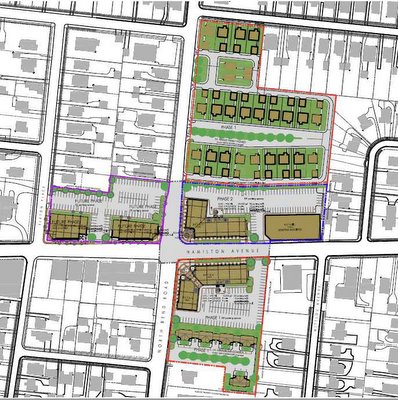Saturday, November 19, 2005
Thursday, November 03, 2005
Dorothy Harris and Amos Robinson Earn Awards for CPOP Participation
This is the documentation of the contribution that earned Dorothy and Amos the 2005 CPOP awards.
Community: College Hill
Problem: Youth/young adults dealing drugs, police arresting but legal system releasing them to College Hill streets within hours. No one was being held accountable.
Date: August 29, 2005
Submitted by: Phyllis Schoenberger, CPOP member, Secretary, College Hill Business Association, Active Citizen on Patrol, Chair of the College Hill Forum Health & Safety Quality of Life Committee
A. Scanning:
Since the inception of the College Hill CPOP team in May 2003, the arrests of those dealing drugs and causing disorder in our community has increased. The problem was that the legal system returned the criminal to the streets within hours with minimal if any safeguards for the community. These young men taunted the Citizens on Patrol (COP)volunteers, making comments that “no way you gonna get me, see, here I am”. The CPOP Team, COP volunteers, and College Hill Neighborhood Officer, Herb Noble, identified this frustrating problem.
B. Analysis:
Residents of the streets to which these drug dealers returned, sometimes with guns, attended the CPOP meeting asking for something to be done. These criminals are identifiable. The Team knew where they lived and where they hung out and dealt drugs. CPOP had input from business owners about them hanging and selling in the business district. We recognized that many of these youth had not finished high school, had no job, and no authority figure in their lives. CPOP invited experts to our meetings in order to educate us, to verify our facts, and to help us be creative in our approach to deal with the problem. These experts included prosecutors, probation officers, and judges.
C. Response:
It seemed clear to the CPOP team after analyzing the problem and especially after talking with those in the legal system, that our community needed to try something that had not been tried before, i.e. to effect change within the legal system. Two members of the CPOP Team volunteered to attend hearings for any one arrested who we knew to be a drug dealer or drug player in College Hill. Dorothy Harris, CPOP Facilitator, and Amos Robinson, CPOP member and active COP volunteer, began the now very effective “court watch” team. This effort was aided by working with Terry Cosgrove in learning the workings of the legal system, accessing computerized criminal records, and ascertaining court dates.
Since then, they are involved for a minimum of twenty hours a week in attending hearings. That does not speak to the time spent using the computer for the pertinent information in following the cases.
Even more important than their focus and dedication to attend hearings is the trust and respect they have earned with judges and prosecutors. They are asked by the judges to give community input and that input is taken seriously in sentencing. Ms. Harris and Mr. Robinson do not always ask for the harshest possible sentencing, knowing that in some cases, prison is not the answer. They recommend that the perpetrator receive community control with stipulations that the youth or young adult is welcome to our community if they take this time to obtain a GED or return to school. Many times they ask that the defendant get a job to support his children. Obviously, the probationer is expected to stop any criminal behavior.
Ms. Harris and Mr. Robinson then inform the community as to the community control stipulations. If the probationer is seen breaking those stipulations, they are reported and they serve their sentence in jail. There are so many reasons to commend these two citizens, but one thing is outstanding and that is the personal risk they take by being in court, highly identifiable, and subject to retaliation.
D. Assessment:
Since the initiation of this “court watch team” the following has happened:
- Judges, with few exceptions, seek them out at trial, asking for their community input regarding the defendant.
- Sentencing has been consistently more in keeping with the merits of the case, what is best for the defendant and what is a more effective safeguard for the community.
- In many cases, Dorothy and Amos make contact with the families who are attending the hearing. Ms. Harris takes every opportunity to talk with the mothers of these young men.
- Criminals who have gotten away with crime, who thought they would never be held accountable, have been arrested and are spending time in jail or on community control. Over the past year at least eight have been convicted because of the presence and input of Dorothy and Amos. Other known drug dealers are no longer in our community because they can more easily work elsewhere.
- Because of their work in the legal system, Mr. Robinson is now leading an effort for College Hill to have its own Probation Officer in order to make community control stipulations more workable. Any breaking of the stipulations can be dealt with more swiftly.
- The involvement of these two College Hill residents has brought hope to our community. It has brought support to the many fine police officers in District 5 who work our streets. It provides proof that the community is behind their hard work in making arrests to rid our business district and residential areas of those who cause fear and disorder.
- At the November 2004 meeting of the College Hill Forum, our community council, Dorothy Harris and Amos Robinson were recognized by the community of College Hill for their “initiative and dedication in working for a safe community”. They were commended for their “invaluable work in combating crime and in creating a working relationship with the Court system that fosters a healthy and vibrant community”.
Posted by
Editor, College Hill eNewsletter
on
Thursday, November 03, 2005
![]()


